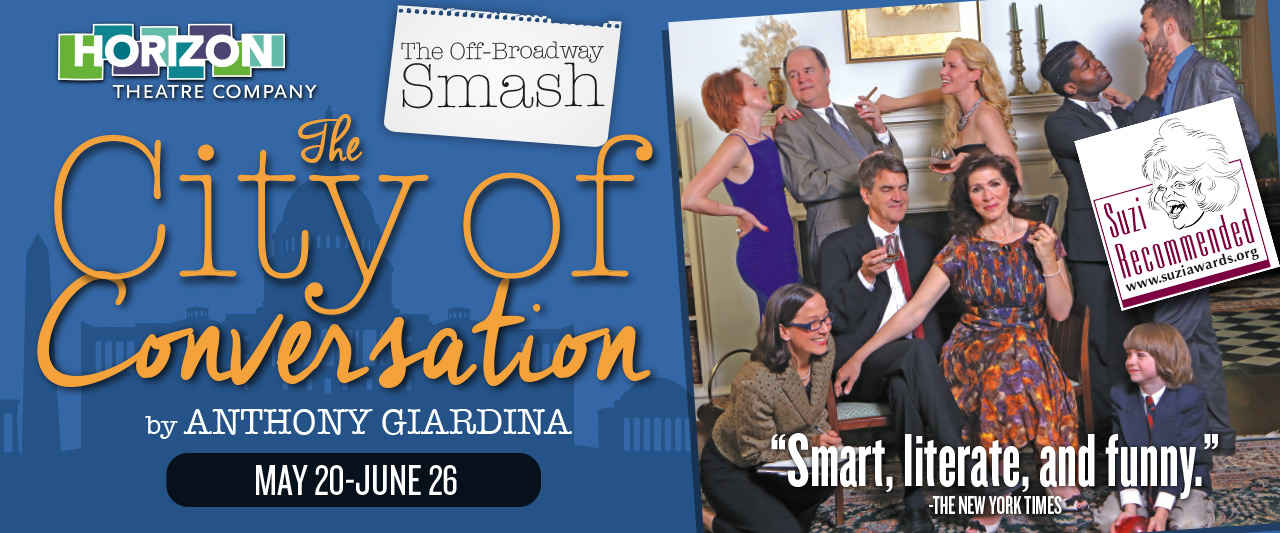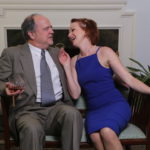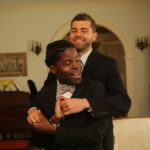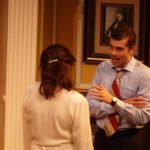by Anthony Giardina
Directed by Justin Anderson
Washington DC was once a place where people actually talked to each other…Hester Ferris opens her home for political foes to lay down arms and raise a glass. But that is all about to change. Colin, her beloved son, brings home a Reaganite girlfriend and a shocking new conservative world view, rocking Hester’s world. Follow the Ferris family from the end of the Carter presidency through the Reagan era and into Obama’s game-changing inauguration. Don’t miss this off-Broadway smash hit!
Length & Content
The City of Conversation runs about 2 1/2 hours with one intermission.
Contains adult language.
There is herbal cigarette smoking on stage.
Handicap seating limited for this production. Please call to reserve if needed.
What People are Saying
A juicy, funny and terrific new play.” – The New York Times
“Terrific … Smart, literate, funny. Mr. Giardina’s stimulating play illuminates the emotional toll that living in such a house divided (and a country divided) can take on its inhabitants.” – The New York Times
“Stirring and entertaining!” – Entertainment Weekly
“Exhilarating … a touching story of personal sacrifice.” – The Washington Post
“An intelligent, provocative, incisive drama about politics, people, ideals and principles, with razor-sharp dialogue.” – Huffington Post
“Lively and engrossing.” – Newsday
“Giardina’s handiwork presents to the world one of the most fair-minded, even compassionate views of the partisan struggles of the city’s political classes you’re likely to encounter these days.” – The Washington Post
“No matter your political persuasion, you’re very likely to feel flashes of rage and frustration. Giardina has created a microcosm of American society in one family: He brutally shows how that family is ripped apart and, more hopefully, how it could be sewn back together.” –Theatremania
More Information
Performance Dates
May 20-June 26, 2016
 Showtimes
Showtimes
Wednesday, Thursday & Friday at 8:00 PM
Saturday at 3:00 PM and 8:30 PM
Sunday at 5:00 PM
Please note there will be no matinee on Saturday May 21st or June 4th.
Pricing
General Admission
- Tickets start at $25 (plus 8% sales tax)
- Prices are subject to change and will rise as performances fill up. GET YOUR TICKETS EARLY FOR THE BEST PRICES.
- SUBSCRIBE TO A 3-PLAY HORIZON SEASON to get the VERY BEST PRICES and RESERVED SEATING!
Bring your neighbors!
Group pricing is available for parties of 10+. Groups of 10-24 receive $3 off the general admission ticket price. Groups of 25+ receive $5 off the general admission ticket price. Call 404.523.1477 x111 or e-mail marketing@horizontheatre.com for more information.
Ticket prices are subject to change. Buy early for best pricing. 8% sales tax will be added to all ticket orders. Internet convenience fee added to all online orders. No refunds, exchanges, or late seating.
Cast (in order of appearance)
Jean Swift- Carolyn Cook*
Colin Ferris/Ethan Ferris (Age 27)-Justin Walker
Anna Fitzgerald-Rachel Garner
Hester Ferris- Tess Malis Kincaid*
George Mallonee- Allan Edwards*
Chandler Harris- Chris Kayser*
Carolyn Mallonee- Deborah Bowman*
Ethan Ferris (Age 6)- Vinny Montague
Donald Logan- Joshua Mitchell
Alternates
Anna Fitzgerald/Carolyn Mallonee- Amelia Fischer
Creative Team
Playwright- Anthony Giardina
Director – Justin Anderson
Scenic Designers – Isabel A. and Moriah Curley-Clay
Lighting Designer – Mary Parker
Sound Designer – Thom Jenkins
Costume Designer- Jordan Jaked Carrier
Props Designer – MC Park
Stage Manager – Julianna M Lee*
*Denotes a member of Actors Equity Association
Show Highlights
Sneak Peek Video
Publicity Photos by Bradley Hester
- The amazing cast of The City of Conversation!
- Colin (Justin Walker) and Anna (Rachel Garner)
- Anna (Rachel Garner) and Hester (Tess Malis Kincaid).
- Senator George Mallonee (Allan Edwards) and his wife Carolyn Mallonee (Deborah Bowman)
- Ethan (Vinny Montague) with Aunt Jean (Carolyn Cook) and Hester (Tess Malis Kincaid).
- Senator Chandler Harris (Chris Kayser) and Hester (Tess Malis Kincaid)
- Ethan (Justin Walker) and his partner Donald (Joshua Mitchell)
Production Photos by Amanda Cantrell
- Colin (Justin Walker) feeds Anna (Rachel Garner) as they arrive home.
- Hester (Tess Malis Kincaid) is unimpressed by Colin (Justin Walker) and Anna (Rachel Garner)
- “DC isn’t about boots like that.”- Colin Hester (Tess Malis Kincaid) agrees.
- Anna (Rachel Garner) comfots Jean (Carolyn Cook)
- Senator Mallonee (Allan Edwards) is impressed with Anna (Rachel Garner)
- Hester (Tess Malis Kincaid) along with Colin (Justin Walker) and Chandler (Chris Kayser) discuss the evening.
- Hester (Tess Malis Kincaid) and Anna (Rachel Garner) are on opposite ends of the aisle.
- Hester (Tess Malis Kincaid) and Anna (Rachel Garner) have a show down with Senator Mallonee (Allen Edwards), Chandler (Chris Kayser) and Carolyn Mallonee (Amelia Fischer) watch.
- Jean (Carolyn Cook) and Hester (Tess Malis Kincaid) work to keep Bork out.
- Chandler (Chris Kayser) shares his day on the hill with Hester (Tess Malis Kincaid) while Ethan (Vinny Montague) watches Cinderella.
- Colin (Justin Walker) explains a point to Hester (Tess Malis Kincaid)
- A moment of peace with Hester (Tess Malis Kincaid) and Anna (Rachel Garner)
- A family of politicians and interesting dynamics- Mom Anna (Rachel Garner) with Dad Colin (Justin Walker) and son Ethan (Vinny Montague)
- Chandler (Chris Kayser) high fives little Ethan (Vinny Montague) . With Anna (Rachel Garner) and Colin (Justin Walker)
- Anna (Rachel Garner) cannot fathom Hester’s (Tess Malis Kincaid) point of view.
- Colin (Justin Walker) stands up to Hester (Tess Malis Kincaid) while Anna (Rachel Garner) watches.
- A tearful goodbye from Hester (Tess Malis Kincaid) to Ethan (Vinny Montague) while Anna (Rachel Garner) and Colin (Justin Walker) look on.
- Donald (Joshua Mitchell) is thrilled with the evening’s possibilities with Ethan (Justin Walker)
- Ethan (Justin Walker) shares a video with his partner Donald (Joshua Mitchell)
- Jean (Carolyn Cook) catches up with Ethan (Justin Walker) and his partner Donald (Joshua Mitchell)
- Hester (Tess Malis Kincaid) discusses the night with Donald (Joshua Mitchell) and Ethan (Justin Walker)
- Ethan (Justin Walker) escorts Hester (Tess Malis Kincaid)
Listen to Director Justin Anderson and lead Tess Malis Kincaid on City Lights on WABE
https://soundcloud.com/waberadio/city-lights-june-16-2016#t=2:00
Listen to Director Justin Anderson and lead Tess Malis Kincaid on AM 1690
“…Intelligent, articulate and frequently witty….”-AJC
“…Inspired and keenly observed….”- AJC
“Giardina’s comedy is squarely on target….”- AJC
“a decidedly sophisticated spark to the script and the characters…” -AJC
“…a delicious piece of theatre you must not miss.”- Atlanta INtown
“This show is a feast for those who love fine acting.” -Atlanta INtown
“Playwright Giardina’s dialogue snaps and crackles, and this A list cast makes the most of it.”- Atlanta INtown
“…hands down the best play on the board in Atlanta.”- Atlanta INtown
“sparked by a superb cast wrangles by Justin Anderson…” -ArtsATL
“combine[s] sly humor with emotional family moments…”-ArtsATL
“an intelligent piece of theatre.” -ArtsATL
“an enthralling and complex political comedy/drama.”-ArtsATL
“Hester Ferris, masterfully performed by Tess Malis Kincaid…”Down South Today
“Rachel Garner in a dynamic performance…”Down South Today
” a must see at Horizon…”- Asher PR
“Engaging from beginning to end…”- Asher PR
“A superb cast under direction of Justin Anderson…” Atlanta Art Scene
Local Reviews
- The Atlanta Journal-Constitution: Topical talk highlights Horizon’s ‘City of Conversation’
- Atlanta INtown: “City of Conversation” at Horizon
- Arts ATL: Superb Cast, Sharp Dialogue Mark Horizon’s City of Conversation
- Wanderlust Atlanta: The City of Conversation, Politics and Family
- The DeKalb Champion: The City of Conversation Likely to Stir Conversation.
- Down South Today: Horizon Theatre’s City of Conversaion: Politics can be Fun!
- Asher PR: The City of Conversation at Horizon Theatre
- The Patch: Horizon’s City of Conversation Reviewed
- Atlanta Art Scene: The City of Conversation (SPOILERS)
Local Press
- Encore Atlanta: SNAPSHOT: Rachel Garner
- Getaway for Grownups: The City of Conversation
- God4BandMe Blog: The City of Conversation at Horizon Theatre
- The Porch Press: A Look at the Present Through the Eyes of the Past
National Press
Want to know more about the play? Check out these reviews from its premiere at Lincoln Center in NYC:
- http://www.broadstreetreview.com/theater/anthony-giardinas-city-of-conversation#
- Spoiler alert!!! This one has a great plot synopsis, but also tells some of the surprises.
- http://www.nytimes.com/2014/05/06/theater/city-of-conversation-charts-a-sea-change-in-washington.html?_r=0
- NYTimes Review
“Whether you want to see a well-written, relevant play or a good, old-fashioned verbal sparring match, you should see “The City of Conversation” at Horizon Theatre Company”
“Another great production. The Horizon never disappoints. Thoroughly enjoyable evening at one of our favorite theaters. Kudos to the entire cast of The City of Conversation!”
“We were all so stunned that we didn’t even know it was intermission”
“Beautiful ensemble work, everyone spot on with strong performances.”
“Another stunning design and execution from the Curley-Clay sisters. Tells a story before the play even begins!”
“Great casting, staging and depth of work showed strength of choices.”
“A big cast of wonderful actors.”
“Truly incredible work.”
“I loved the pace, the clarity of identity and purpose of each character, the great comic timing of so many lines, the HEART of the characters.”
“Overall a very entertaining evening of theater, allowing several of Atlanta’s best actors an opportunity to flex their muscles, all on one of the most beautiful sets I’ve ever seen.”
“I was particularly impressed with Rachel Garner as she was able to hold her own with Tess [Malis Kincaid] during their scenes.”
“Overall this is a fun and engaging production. The actors are having a good time and wanting to bring the audience along.”
“Truly outstanding performances by all the actors. Each character was clearly defined, distinctly human and honestly played.”
‘The direction was deftly nuanced and well paced.”
“The play was absolutely amazing. The content was so interesting. The actors were unbelievable!!!”
“I’ve seen a lot of theatre this year around Atlanta and this was one of the best”
“This whole evening was amazing”
“Excellent!”
“Just loved it!!”
“I’m coming back and bringing friends!”
“I LOVED it!!! Incredible story!”
We are lucky to have a show rich in history and based in facts. Learn more about the real world situations that affect the characters and their world. Click the links below to learn more!
The Rise and Fall of the Georgetown Salons
In 1877, Henry and Clover Adams began hosting political contemporaries to dinner in their H Street home across from the White House. These salon parties, where neighbors and political movers and shakers came to break bread while discussing the critical issues of the day, prompted Henry James to call Washington DC the “city of conversation.” Salon parties continued throughout history, reaching their peak influence under nationally syndicated columnist Joseph Alsop in the 1950s and 60s. Alsop’s “Sunday Night Supper,” whose regular guest list included people such as Frank Wisner, Chief of Covert Operations at the CIA, George Kennan, the State Department Official who created the Containment Doctrine, Charles Bohlen, the State Department’s lead Sovietologist, and Katharine Graham, owner of The Washington Post, along with rotating guests of political and journalist importance, are credited with not only influencing events such as the Cuban Missile Crisis, but also countless bills and legislature making it through Congress. No matter the issue at hand, all of the guests operated with the assumption that no matter what the perspective of a specific issue was, everyone was basically on the same side. There were battles, but not wars, and the expectation of civility prevailed.
The Vietnam War was the beginning of the end, as the illusion of self-containment was lost, and the foreign policy establishment crumbled. After Nixon left office, no one in office cared what “Georgetown thinks,” and when Carter arrived, he did not even respond to his dinner invitation. By 1987, Sally Quinn officially declared the Georgetown Hostess dead in an article in The Post Magazine, and noted “the common refrain that our government hasn’t worked as well, and civility in this town has suffered, since the personal connections that hostesses facilitated have been lost.”
Carter versus Reagan and the 1980 Presidential Bid
Reagan first hit the national scene in 1964 when he supported Barry Goldwater’s campaign, and basically laid out the foundation of his conservative philosophy. By the time he was the one running for President, Reagan’s campaign was founded on 4 key ideas: less government, stronger defense, anti-Communism, and a belief that America could be strong again. These simple ideas brought the new and old Right together and proved too strong for a Democratic incumbent. While Reagan ran on simple ideas, Carter stayed true to his Christian faith, and was the only president, up to then, whose speeches contained the words “love,” “tenderness,” and “healing.” More important, though, was the straight-forwardness of Reagan’s ideology, and his approach to issues in a black and white way, while Carter dove too deeply into the complexity of the challenges facing America and the world.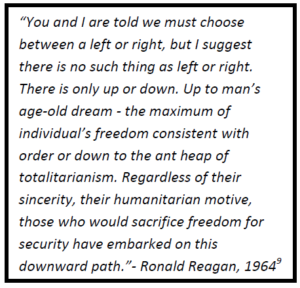
On November 4, 1980, at 9:01pm ET, Carter called Reagan to congratulate him on a victory. At 10:31pm ET, Carter publicly conceded the election, making it the earliest concession since 1904. Although Reagan is credited with having a “decisive” victory, the 1980 election had the lowest voter turnout since 1948, with only 52.4% of registered voters participating. Nonetheless, the American paradigm had shifted, and Reagan’s new conservatism was ascending.
Supreme Court Nominee Robert Bork
June 26th, 1987, Justice Lewis Powell retired his seat on the Supreme Court.
July 1st, 1987, Robert Bork was nominated by President Reagan.
October 6, 1987, Robert Bork’s nomination was rejected in committee by a 9-5 vote
October 9, 1987, Robert Bork called for a full debate and final Senate decision over his confirmation
October 23, 1987, the Senate rejected Bork 58 to 42.
In only three short months, the confirmation process for Supreme Court Justices would be forever changed, and the ability to have a civil discourse between the two parties would be lost.
Bork’s nomination brought out the worst in the parties. Within 45 minutes of being nominated, Senator Ted Kennedy took to the Senate floor to condemn Bork not only as a possible judge, but also as a person. This speech is now noted as the beginning of the character assassination of candidates we see in the political arena today.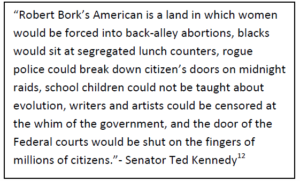
But Bork’s failure to be confirmed may have had roots in his ideology. In a 2011 interview, Bork stands by his views that married couples have no constitutional right to contraception, that the First Amendment right to freedom of speech should be limited to political speech, and not protect other forms of expression such as scientific, literary or pornographic, that the Equal Protection Clause in the 14th Amendment should not apply to women, as well as the idea that the Constitution does not contain a right to privacy. In addition to these interpretations of the Constitution, Bork’s judicial record shows a failure to apply any judicial philosophy consistently. Often in his appellate courts, outcomes could be predicted by the parties involved, as he was generally for the government when opposed by consumer, environmental, or civil rights group, while against the government when opposed by business interests. By his own testimony, Bork saw the court having a primary need to focus on intellect and ideology, rather than concerning themselves with how their decisions impacted the real world. As a result, Bork is one of only three Supreme Court nominees to ever be opposed by the ACLU. 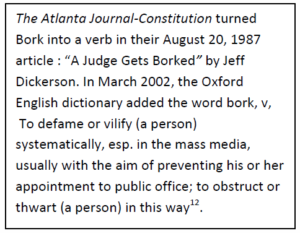
Although Bork was not the first Supreme Court nominee to be rejected, he was the first to be rejected down party lines over his ideology rather than scandal. Eventually the empty seat went to Anthony Kennedy.
The Effects in the Post-Bork Era
Joe Nocera, of The New York Times, notes, “The Bork fight, in some ways, was the beginning of the end of civil discourse in politics. The anger between Democrats and Republicans, the unwillingness to work together, the profound mistrust- the line from Bork to today’s ugly politics is a straight one.”
When it comes to Supreme Court nominee confirmations, the fallout of Bork is starkly seen, as it began a debate over possible limits to the “Advice and Consent of the Senate” from Article Two of the US Constitution, which requires the Senate to sign off on the Presidential nominees. The fight the Democrats started in 1987 is a stumbling block even today, as the nominee for Scalia’s seat is promised to be blocked by the Republican held Senate until President Obama leaves office. Additionally, even the Senate hearings are affected as Bork’s hearings, led by then-Senator Joe Biden, as today’s nominees are hesitant to voice a distinct opinion on possible interpretations for fear of being under the same attack. A call for judicial records to be scoured for consistency in application, rather than ideology has been in play for a while, despite it being a difficult measure to judge ability.
In addition to the judicial ramification, the emotional divide between parties has reached a discriminatory level. In an article just released in May 2016, colleges are starting to see and study the affects of this growing trend. 45% of Democrats and Republicans admitted to choosing a scholarship recipient based on their party affiliation, when all other areas were equal, and party affiliation affect their decision more than race. How did this polarization happen?
Original Sources
- “In a New Play, the Washington Hostess Lives Again” by Sally Quinn for The Washington Post
- “What Really Happened at Those Famous Georgetown Dinner Parties” by Roxanne Roberts for The Washington Post
- “The Ugliness Started With Bork” by Joe Nocera for The New York Times
- “Why Nixon Hated Georgetown” by Evan Thomas for Politico Magazine
- The Unfinished Presidency: Jimmy Carter’s Journey Beyond the White House by Douglas Brinkley excerpt for The New York Times
- “Robert Bork on Obama, The Supreme Court, Nixon, & Being Mitt Romney’s Adviser” by Lloyd Grove for Newsweek Magazine
- “Why Judge Bork was Rejected” by Eric R. Glitzenstein for The Washington Post
- “The Ruins of Georgetown” by Sidney Blumenthal for The New Yorker (PDF file)
- “Ronald Reagan and the Conservative Movement- A Revolution? A Reaction? A Reform?” by R.T. Johnson for The History Rat Blog
- “Conservatism and the Rise of Ronald Reagan” US Department of State
- “Robert Bork Supreme Court Nomination” from Wikipedia
- “Democrats Will be Fighting the Ghost of Robert Bork This Year” by Kevin Drum for Mother Jones
- “A Confession of Liberal Intolerance” by Nicholas Kristof for The New York Times
Expert Conversation will follow the June 25th 3pm Matinee.
Join Horizon as we host Expert Conversation, a special talkback with two experts!
Two constitutional law experts will help discuss the prominent and topical topics that occur during City of Conversation. From the rise of conservatism to confirming a Supreme Court Justice to what Obama’s administration means and how all of this affects the coming November elections, our experts will answer questions and lead the audience through a thought provoking post show experience. Join the conversation and help bring civility back to politics.
The talkback is free and does not require a ticket to the show, however, having seen the show will greatly increase the value of the experience.
Tickets to the show must be purchased in advance at horizontheatre.comor by calling the box office at 404.584.7450.
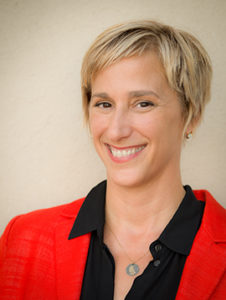 Lori A. Ringhand
Lori A. Ringhand
B.A., University of Wisconsin at Eau Claire
J.D., University of Wisconsin
B.C.L., University of Oxford
Constitutional Law
Election Law
State and Local Government
Lori A. Ringhand became Georgia Law’s associate dean for academic affairs in the fall of 2015. She teaches courses on constitutional law, election law, and state and local government law. She has been a member of the Georgia Law faculty since 2008 and was named a Hosch Professor in 2012.
She is a nationally known Supreme Court scholar and the author of the book Supreme Court Confirmation Hearings and Constitutional Change (with Paul M. Collins) published in 2013 by Cambridge University Press. She also is the co-author of Constitutional Law: A Context and Practices Casebook, which is part of a series of casebooks dedicated to incorporating active teaching and learning methods into traditional law school casebooks. Her work has been published in journals such as the Constitutional Commentary, the American University Law Review, theElection Law Journal and the University of Pennsylvania Journal of Constitutional Law. Ringhand’s work also has been recognized by a Congressional Research Grant awarded by The Dirksen Congressional Center.
Ringhand graduated from the University of Wisconsin Law School, where she served as an articles editor on theWisconsin Law Review. She also holds a Bachelor of Civil Law degree, awarded with distinction, from the University of Oxford.
Before coming to UGA, Ringhand served on the faculty of the University of Kentucky College of Law and as a visiting scholar at the Oxford Institute of European and Comparative Law. While at the law school, she maintained her connections to Oxford by serving as the director of the law school’s semester-long study abroad program at Oxford from 2012 to 2015.
Ringhand also received the law school’s highest teaching honor, the C. Ronald Ellington Award for Excellence in Teaching, in 2010 and 2015.
To learn more, click HERE.
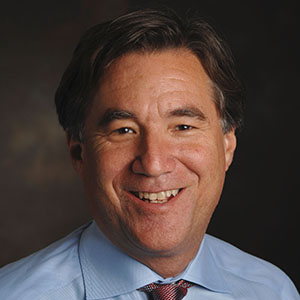 Eric J. Segall
Eric J. Segall
Kathy and Lawrence Ashe Professor of Law, Georgia State University
- Education
- J.D., Vanderbilt University
B.A., Emory University
- Biography
-
Eric Segall graduated from Emory University, Phi Beta Kappa, Summa Cum Laude, and from Vanderbilt Law School where he was the Research Editor for the Law Review and member of Order of the Coif. He clerked for the Honorable Charles Moye, Jr., Chief Judge for the Northern District of Georgia, and Albert J. Henderson of the Eleventh Circuit Court of Appeals. After his clerkships, he worked for Gibson, Dunn & Crutcher, and the United States Department of Justice, before joining the GSU faculty in 1991.
Professor Segall teaches federal courts and constitutional law I and II. He is the author of the book Supreme Myths: Why the Supreme Court is not a Court and its Justices are not Judges. His articles on constitutional law have appeared in, among others, the Stanford Law Review, the UCLA Law Review, the George Washington Law Review, the Washington University Law Review, the University of Pennsylvania Journal of Constitutional Law, the Northwestern University Law Review Colloquy, and Constitutional Commentary. He has served on the Executive Committee of the AALS section on federal courts, and has given numerous speeches both inside and outside the academy on constitutional law questions and the Supreme Court. He appears regularly on the national XM Radio show StandUp with Pete Dominick talking about the Supreme Court and constitutional law.
To learn more, click HERE.


